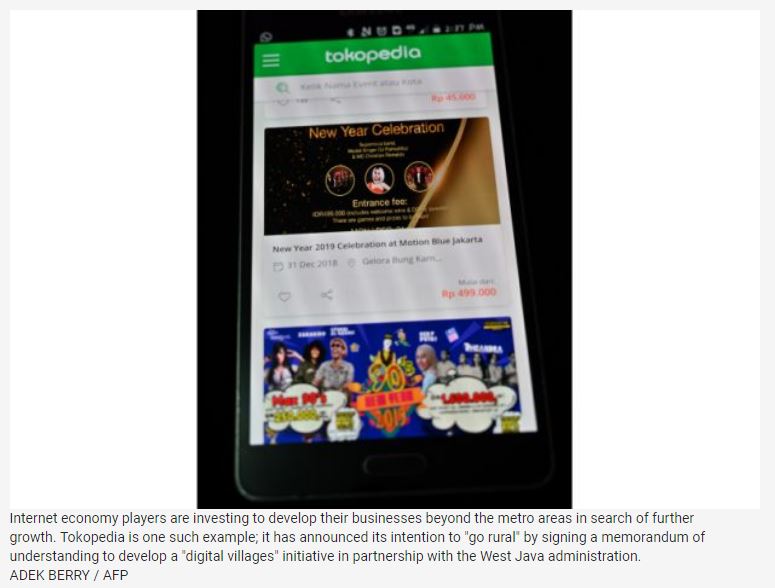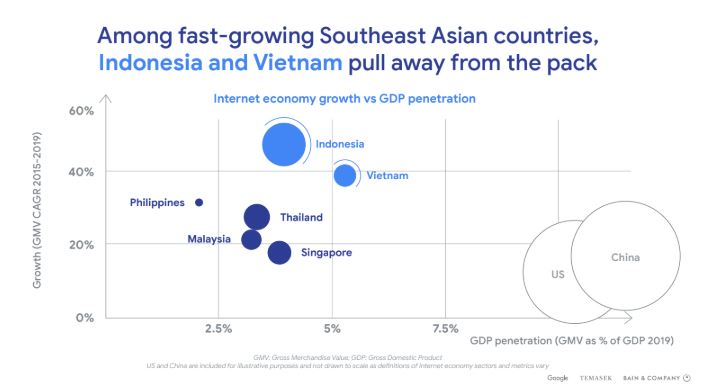Non-metro areas in South-east Asia to drive the next phase of Internet economy growth
Even as more than half of South-east Asia’s Internet economy is made up by seven metro areas, there are clear signs that Internet economy players are investing to develop their businesses beyond these areas in search of further growth.
Tokopedia for instance, in August announced its intention to “go rural” by signing a memorandum of understanding to develop a “digital villages” initiative in partnership with the West Java administration.
Today, the seven metro areas – Jakarta Bogor Depok Tangerang Bekasi (Jabodetabek) in Indonesia; Kuala Lumpur and Klang Valley in Malaysia; Metro Manila in the Philippines; Singapore; Greater Bangkok in Thailand; as well as Hanoi and Ho Chi Minh City in Vietnam – make up 52 per cent of South-east Asia’s Internet economy.
But with the increasing adoption of digital payments and telecom carrier billing options, more subscribers from outside the metros are paying for premium online media services such as gaming, music and video on demand.
Indeed, the digital payments market in South-east Asia has hit an inflexion point, and growth in this segment is likely to propel the region’s Internet economy in the region to a US$300 billion market by 2025.
This is according to the annual e-Conomy report by Google, Temasek Holdings and Bain & Company released on Thursday, which showed a US$100 billion bump in its US$200 billion projection made in 2016.
South-east Asia’s digital payments market is projected to exceed US$1 trillion by 2025 to become the payment method for almost one in every two dollars spent in the region.
In an interview with The Business Times, Rohit Sipahimalani, joint head of the portfolio strategy and risk group at Temasek noted that while the last few years has been a story of the seven metros in the region that has driven most of the growth, the next phase will be driven by areas outside the metros.
In fact, the report posits that the Internet economy in areas beyond the Metros is projected to grow fourfold between 2019 and 2025, twice as fast as in Metro areas.
“It does help that now you have payments infrastructure which is better (and) that there is more money going into logistics, which is going to be very important in certain markets to be able to serve these consumers,” said Mr Sipahimalani.
Two-speed South-east Asia
The report also noted that even as the Internet economy is thriving across South-east Asian countries, speed is relative. Even as the region has grown at an average rate of 33 per cent a year since 2015, Indonesia and Vietnam have pulled away from the pack.
Indonesia specifically, is the largest and fastest growing internet economy in the region. Estimated at US$40 billion in 2019, Indonesia’s internet economy has more than quadrupled in size since 2015 at an average growth rate of 49 per cent a year.
As the largest and fastest growing Internet economy in the region, Indonesia is well on track to cross the $130 billion mark by 2025. In particular, the e-commerce and ride hailing sectors are firing on all cylinders, fueled by intense competition between Indonesian and regional players, noted the report.
Vietnam’s Internet economy is booming as well, as it reaches for US$12 billion in 2019 on a 38 per cent annualised growth rate since 2015.
With the GMV of its Internet economy set to account for over 5 per cent of the country’s GDP in 2019, Vietnam is emerging as the most digital of all economies in the region. e-commerce is a key driver behind the impressive numbers, where homegrown marketplaces like Sendo and Tiki compete with regional players like Lazada and Shopee.
Leveraging the Internet
A decade ago, four in five in South-East Asia had no access to the Internet. Today, the Internet is transforming the way the region does business. 24-year-old Yolanda, the founder of Indonesia-based Salad Nyoo and Long, a photographer and Vietnam-based Airbnb Experiences host.
Source: https://www.businesstimes.com.sg/asean-business/non-metro-areas-in-south-east-asia-to-drive-the-next-phase-of-internet-economy-growth


 Thailand
Thailand





